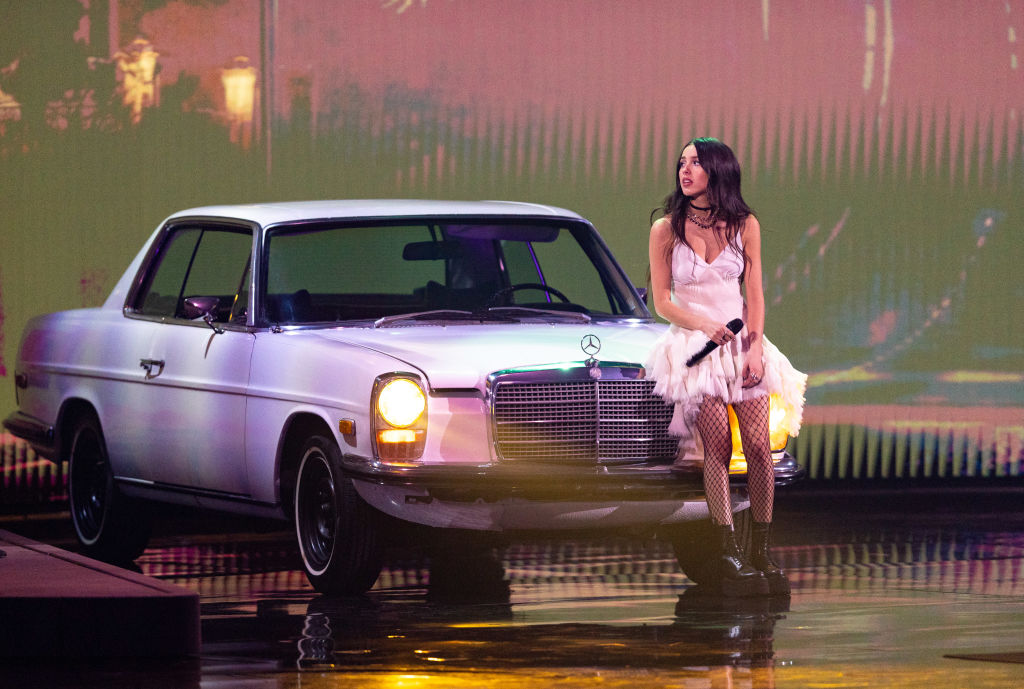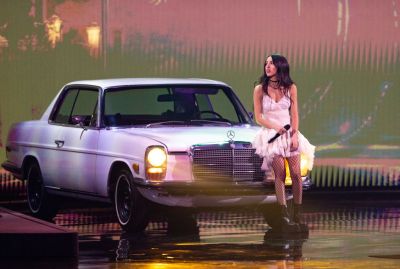“Drivers License” launched then-17-year-old Olivia Rodrigo into the global spotlight with eight weeks atop the Billboard Hot 100 in 2021. Her debut album “Sour” also shattered records when it was released four months later, and critics soon crowned her “the fresh face of Gen Z.” Two years later, Rodrigo’s new single “Vampire,” brings her back with more lavender-tinged nostalgia and adolescent angst. Listeners want more of both, and she has shown she is more than the one-hit wonder some feared she’d become.
Teenage pop stars will always resonate with fellow teens, but Rodrigo’s confessional pop made that coveted leap into superstardom. Why are her songs about teenagers falling out of love and not being able to parallel park captivating?
Rodrigo’s rise can be explained not in spite of her melodramatic musings but because of them. She captures complicated feelings of adolescence but packs them into three-minute singalong bops. And recalling younger and more vulnerable years is emblematic of a broader contemporary trend.
We’re in the throes of a summer that for many looks like glamorized teenage years. Younger and older adult women alike are reaching for multicolored friendship bracelets and glittery cherry earrings. Tens of thousands of fans dressed in the sparkliest outfits they could find and flocked to Taylor Swift’s or Beyonce’s record-breaking arena tours. Barbiecore (hot pink head to toe) and mermaidcore (shimmery, aqua, iridescent) are among the summer’s most prominent trends, catalyzed by the release of two of this summer’s biggest studio films. Rodrigo’s musical appeal correlates with this hyperstylized teenage aesthetic.
But there’s also an affective appeal to Rodrigo’s music. This is our first official post-pandemic summer, a time that like teenage years was riddled with its share of uncertainty and anxiety. “The tween girl trend makes sense,” one writer suggested in Fast Company, adding we could understand its draw as “a kind of metaphor for the psychological state we find ourselves in now.” That may take things too far, but slipping back into the teenage mindset—even for just the length of a pop song—offers a bit of catharsis.
There’s a similar catharsis spread throughout Rodrigo’s lyrics, which often directly address past love interests. “I hope that you’re happy,” she confesses in one song, “but don’t be happier.” In another, she adopts a more accusatory tone, before crescendoing to an explosive “You betrayed me.” In her most recent single “Vampire,” the singer shows she’s increasingly aware of her role as a dramatic provocateur. “I should have known it was strange,” she sings, “you only come out at night, ” elevating her boy-villain into the realm of folklore.
Rodrigo’s almost caricature-like intensity may strike older adults as unhelpfully melodramatic, but her candor also sheds light on the trickiness of love at that particular stage of life. Breakups, as Spencer Kornhaber wrote in his review of Rodrigo’s first album, are “heavy stuff at any age but especially when you’re dealing with it for the first time.” Teenagers don’t have a monopoly over sorrow and heartbreak, but clear-eyed articulations of adolescent heartbreak, when well done, can be more illuminating than indulgent.
Moreover, they’re not without precedent. Rodrigo might well be part of the trend of twenty-somethings delaying adulthood, but she also gestures to a lineage of artists who chose to see through the eyes of a young protagonist. For Dickens’ Pip in Great Expectations and Mark Twain’s protagonist in Huckleberry Finn, to even more recent characters in Hogwarts, Arrakis, and Tatooine, fresh eyes are essential to how well they observe and communicate complex themes, because everything feels amplified in adolescence. Those works recognized the limitations of their protagonist’s perspectives, and also wagered they could offer insights that adults would overlook.
Amid the flurry of purple butterfly clips, glitter, and white sneakers, I saw Rodrigo perform during her "Sour" tour two years ago. She and a stadium full of giddy fans sang one of her most famous lines: “I’m not cool / and I’m not smart / and I can’t even parallel park.” The last part of the line was literally true for about half of the audience. Regardless, everyone sang along at the same fever pitch. Whether it’s nostalgia for simpler times or an indulgent escapism remains unclear. What’s crystal clear is that a large segment of a generation is fervently listening to what Rodrigo has to say—and sing.






Please note that we at The Dispatch hold ourselves, our work, and our commenters to a higher standard than other places on the internet. We welcome comments that foster genuine debate or discussion—including comments critical of us or our work—but responses that include ad hominem attacks on fellow Dispatch members or are intended to stoke fear and anger may be moderated.
With your membership, you only have the ability to comment on The Morning Dispatch articles. Consider upgrading to join the conversation everywhere.